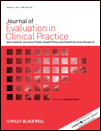The role of oncologists in multidisciplinary cancer teams in the UK: an untapped resource for team leadership?
Abstract
Background and aims In the UK, cancer care is managed via multidisciplinary teams (MDT). Core members of these teams are typically surgeons, oncologists, radiologists, pathologists and clinical nurse specialists (with other health care professionals potentially present). Good teamwork, including team communication and leadership, has been shown to be a prerequisite for safe care delivery in other health care contexts, but cancer MDT team working processes are yet to be fully explored. This study aimed to assess the self-perceived contribution of oncologists to MDTs, with emphasis on their potential role as team leaders.
Methods Data were collected at the British Uro-oncology Group 6th Annual Meeting (Sep 11–12 2009, York, UK). Respondents completed various items related to their perceived contribution to MDTs, aspects of current and potential MDT leadership, team decision making in these meetings, and also demographic information.
Results Seventy-seven oncologists attended the meeting, of whom 61 fully completed the survey (response rate 79%). Oncologists reported that their contribution to the MDT discussion carries equal weight to those of surgeons, radiologists and pathologists. Whereas 83% of respondents reported that MDT chairmanship could rotate, only 39% reported that it does in their own MDTs. More than 90% of respondents thought that oncologists (clinical or medical) could chair these meetings, but only 25% of them had ever chaired their own MDT.
Conclusions Despite a high level of contribution to MDTs and the respect of their colleagues, oncologists are not taking leadership roles within MDTs at the level that they expect. This study raises the question of whether a re-evaluation the leadership of MDTs is required with clinicians from a variety of specialities being given opportunities to develop skills necessary to lead cancer MDTs and improve team performance and ultimately cancer care.




